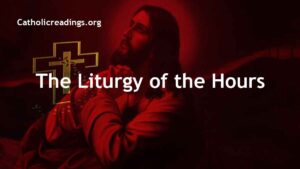The Liturgy of the Hours is like a daily conversation between people and God. It’s a special way for Catholics, monks, and nuns to pray at different times throughout the day.
Imagine it as a rhythm of prayer that marks the morning, noon, evening, and night. People using the Liturgy of the Hours come together to read Psalms, prayers, and reflections, creating a shared spiritual experience.
This practice helps individuals and communities connect with God in a meaningful way, making each day a journey of reflection, gratitude, and devotion.
The Liturgy of the Hours is also called the Divine Office or the Work of God. These are the daily prayers, prayed each day at the canonical hours of the Roman Catholic Church to sanctify the day with prayer. These prayers are found in the Breviary.
During the Liturgy of the Hours, the faithful hold a meditative dialogue with God using scripture, Prayers, antiphons, and hymns.
These dialogues range between a person and God, the Church and God, the Church and the world, or among the Church members. However, the dialogue is always held in God’s presence.
Each of the canonical hours contains selections from the Psalms. The Morning and Evening Prayers have a Gospel reading each.
The Morning Prayer has the Benedictus (the Canticle of Zechariah from Luke 1:68-79), while the Evening Prayer has the Magnificant (the Canticle of Mary from Luke 1:46-55).
All bishops, priests, and deacons who plan to become priests are obligated to celebrate the Divine Office and many congregations urge their members to celebrate jointly as opposed to alone.
In the Roman Catholic Church, the lay people are also encouraged, but not obligated, to observe the Liturgy of the Hours, together with the priests or other people, or even alone.
Previously, the Liturgy of the Hours comprised of eight canonical hours as postulated by St Benedict of Nursia in his Rule (Rule of St Benedict). The eight hours were;
- Matins also called Vigil (about 2 am)
- Lauds or Dawn Prayer (about 5 am)
- Prime or Early Morning Prayer (First Hour – around 6 am)
- Terce or Mid-Morning Prayer (Third Hour – around 9 am)
- Sext or Midday Prayer (Sixth Hour – around 12 noon)
- None or Mid-Afternoon Prayer (Ninth Hour – around 3 pm)
- Vespers or Evening Prayer (“at the lighting of the lamps” – around 6 pm)
- Compline or Night Prayer (before retiring, – around 7 pm)
However, after the liturgical changes that were effected during the Second Vatican Council, the content and the hours were changed or, let’s say, realigned. The five Hours of the Divine Office that were agreed upon are;

The Office of Readings (Formerly Matins)
This comprises a selection of passages from the Bible for meditation together with the best excerpts from spiritual writers.
Lauds or Morning Prayer
Prayed in the morning when you wake up from sleep to sanctify your day from the beginning. At this hour, we also remember the resurrection of our Lord Jesus Christ who is the true light enlightening all people.
Daytime Prayer
To be prayed in either of these hours:
- Terce or Midmorning Prayer before Noon
- Sext or Midday Prayer
- None or Afternoon or Midafternoon Prayer
Vespers or Evening Prayer
Prayed when the day is already far spent and soon darkness starts to fall.
Compline or Night Prayer
The last prayer of the day, said before retiring, even if that is after midnight.
There are three official English translations of the new Liturgy of the Hours as produced after the Second Vatican Council. These translations are produced by ICEL.
ICEL (International Commission on English in the Liturgy) is the commission that was set up by several episcopal conferences of English-speaking countries to assist in providing English translations from Latin of the liturgical books of the Roman Rite. These three translations are;
Liturgy of the Hours (non-ICEL translation)
Produced by a commission set up by the Episcopal Conferences of England, Wales, Scotland, Ireland, and Australia.
Liturgy of the Hours (ICEL translation)
Produced by ICEL and is in use officially in the US and Canada.
Liturgy of the Hours (ICEL/African translation)
Produced for the Catholic Church in Africa in 2009 by the Synod of African Bishops in Rome and published by the Paulines Publications Africa. This English edition was based on the Liturgia Horarum, editio typica altera.
Related Links
Powered By SEO Experts
Follow @ReadingCatholic
